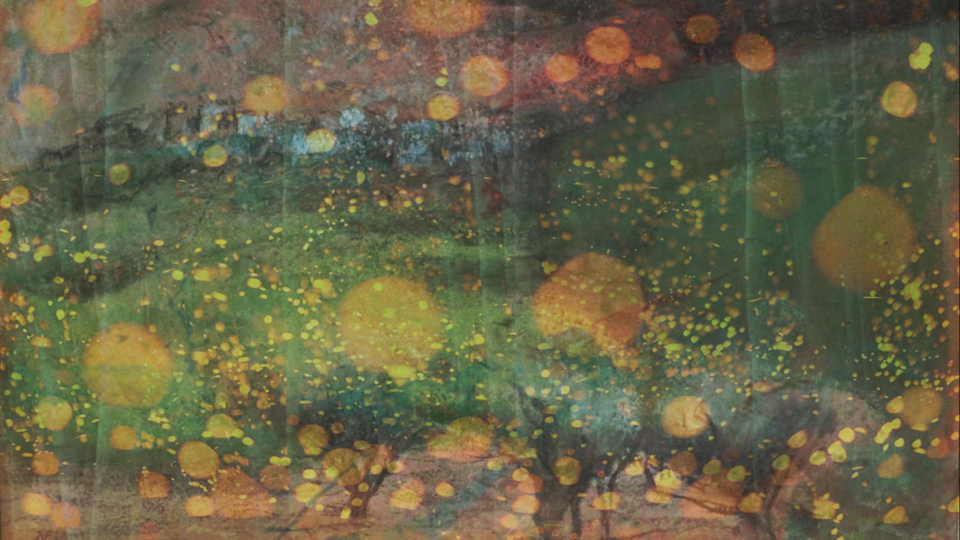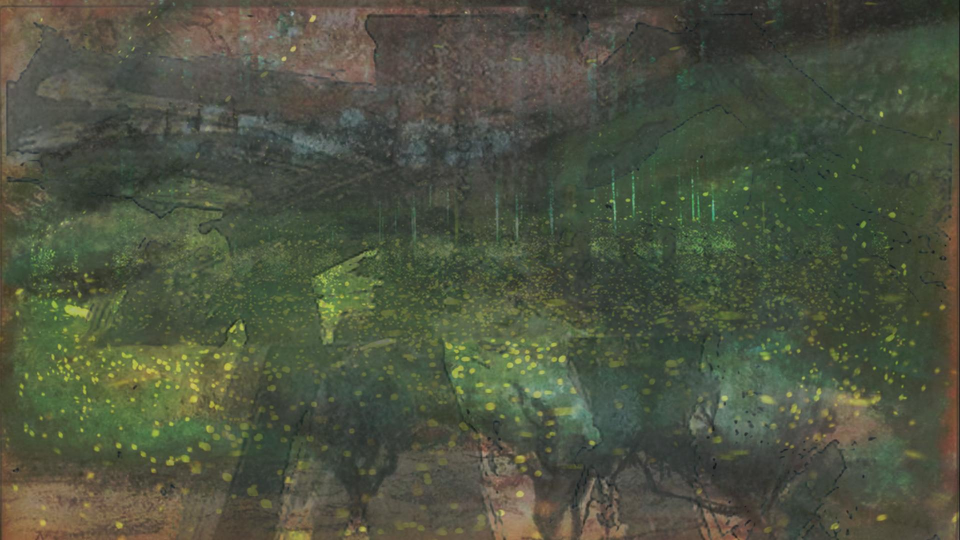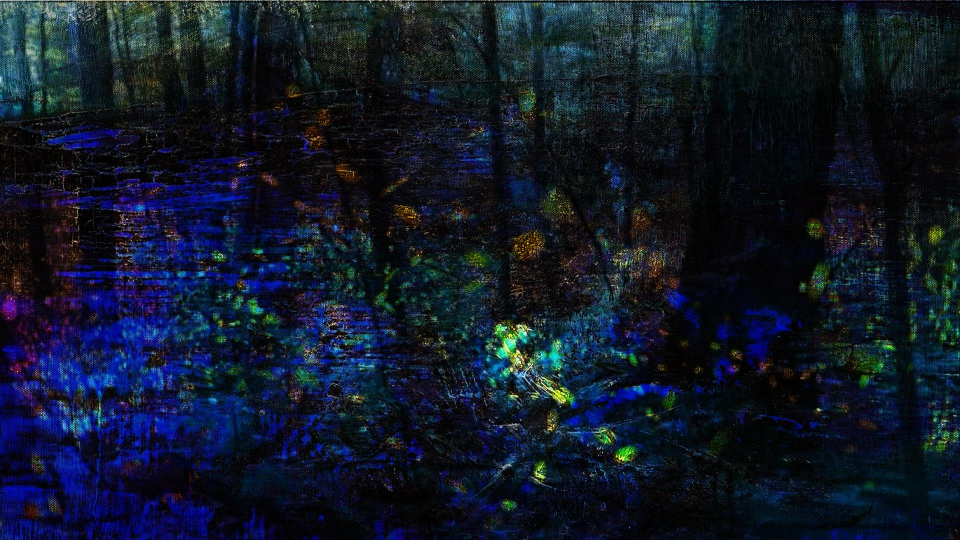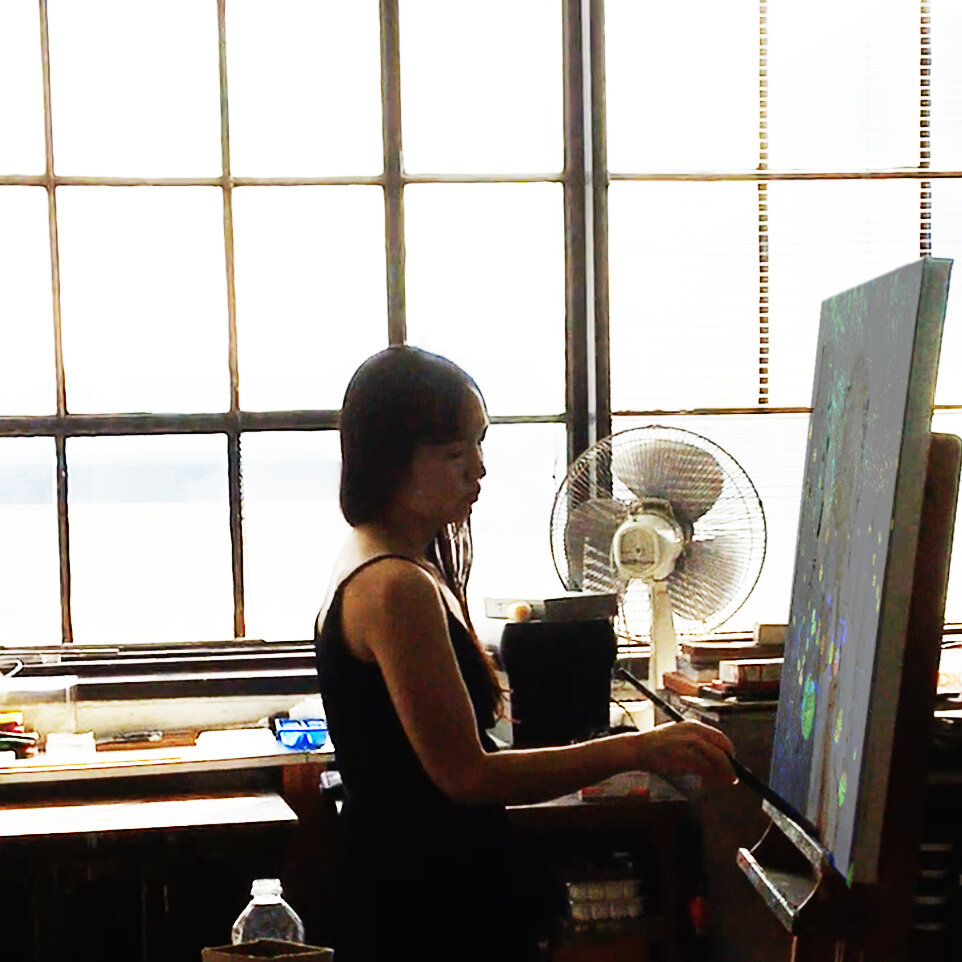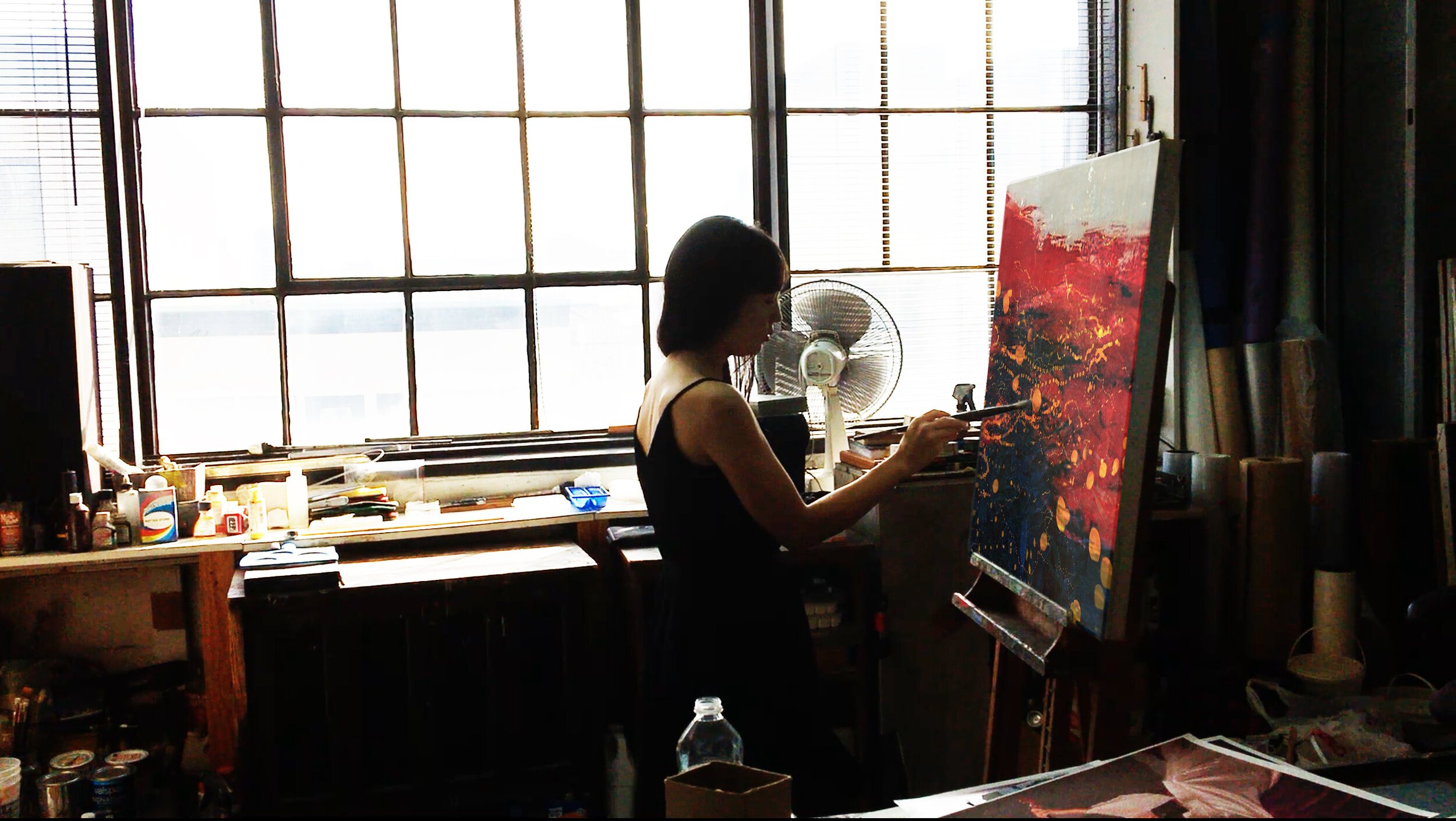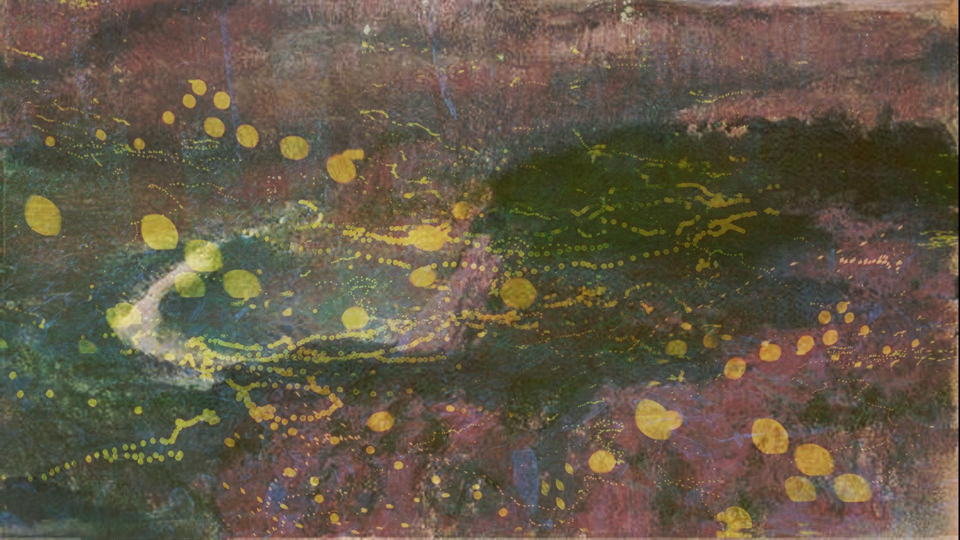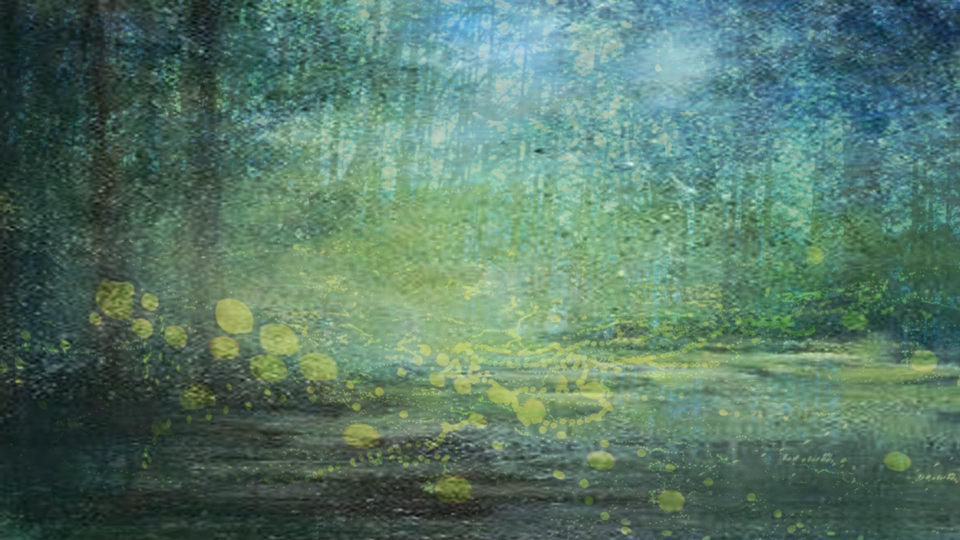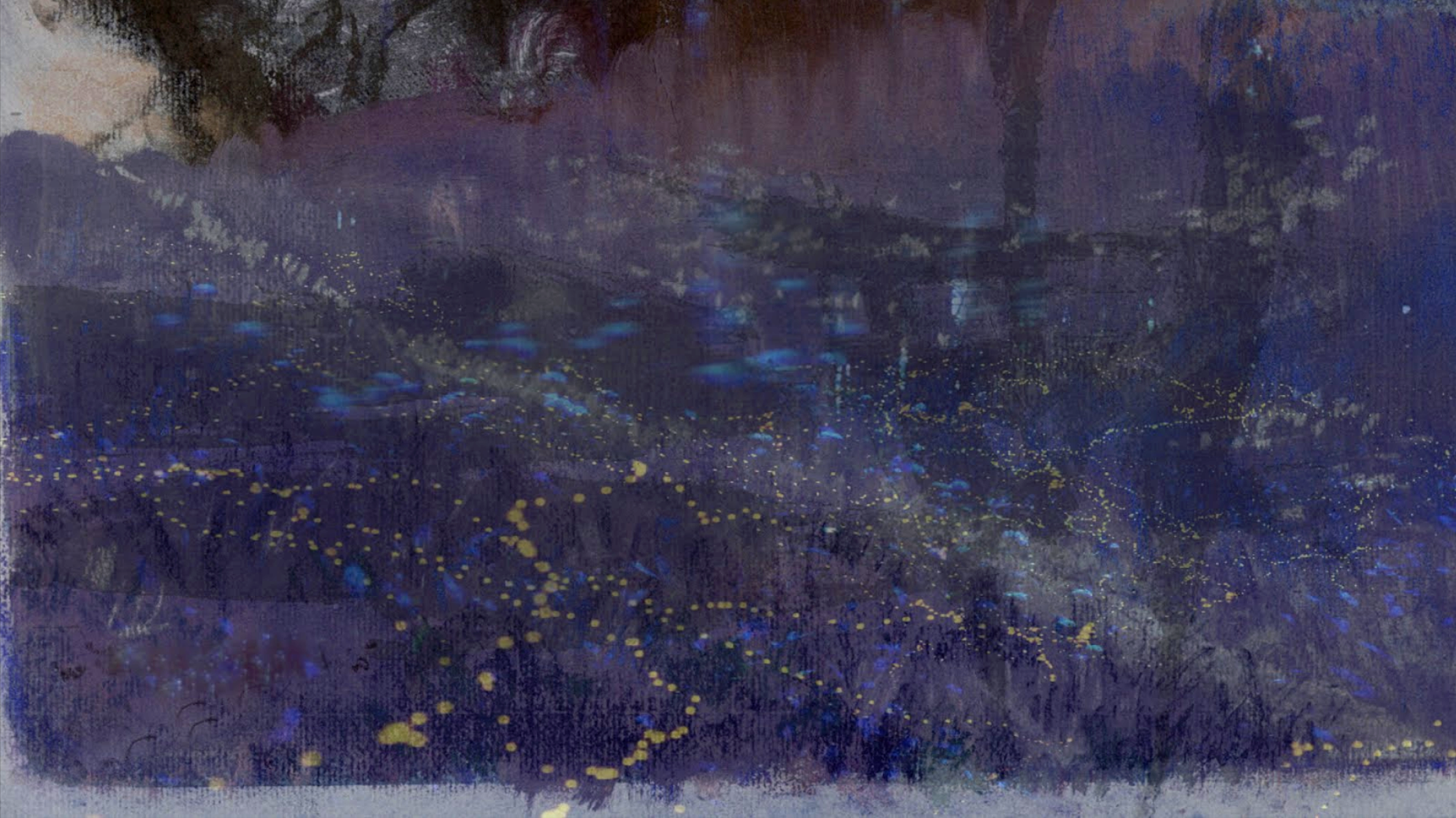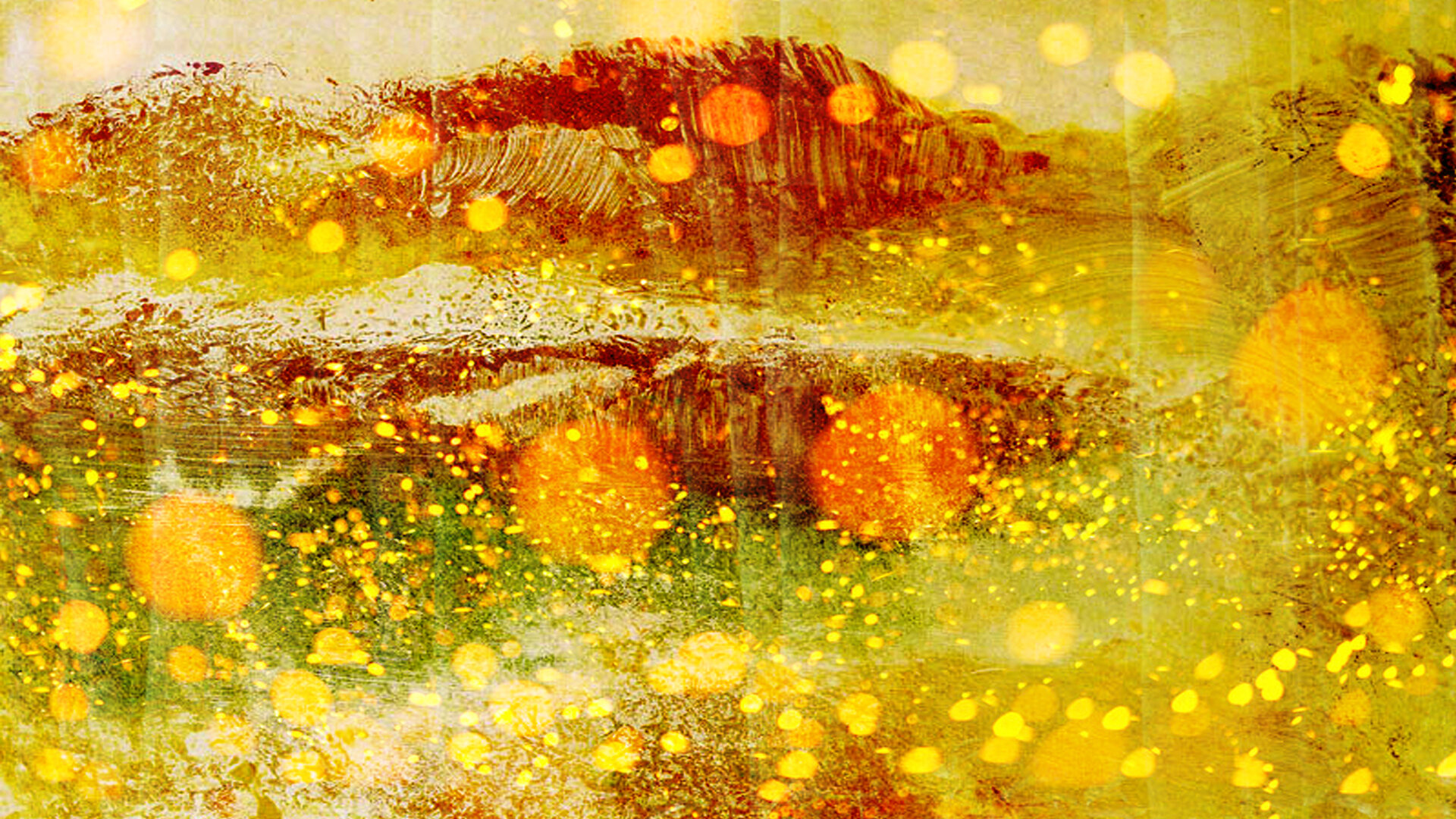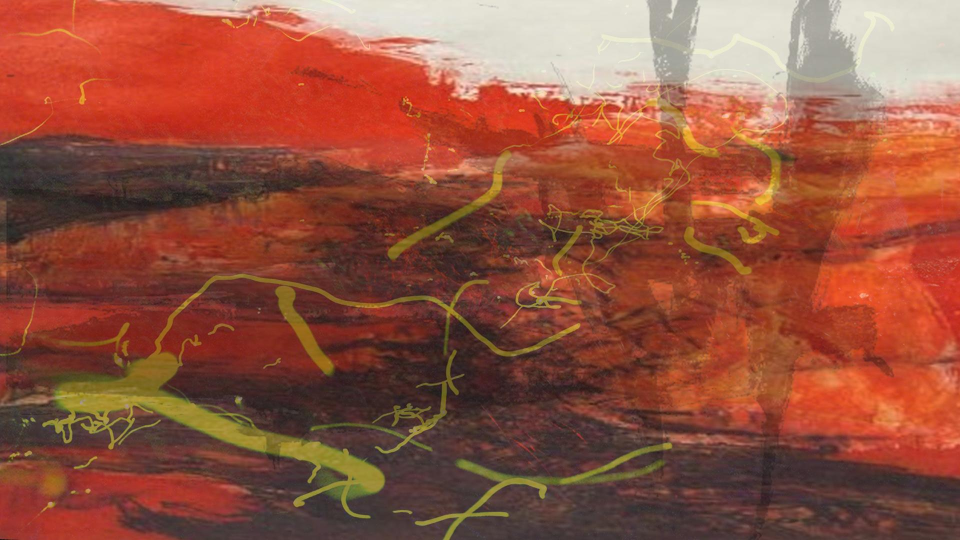We are honoured to include in projection elements of The Creative Process traveling exhibition creative works by people from over 60 countries. In response to poems by international writers, I created some of the abstracts you see above. This is part of the ongoing process of making portraits and other creative works in response to participants in the project. We also invite students to respond creatively to our interviews and their work is included as part of podcasts, published pieces and projection elements.
Mia Funk, Red Night
Mixed technique on paper (gouache, pierre noire, encre de chine, pastel, ink, and other mediums)
Mia Funk, Fire
Mixed technique on paper (gouache, pierre noire, encre de chine, pastel, ink, and other mediums)
I. It was the ancient love for fire seared the hearts of the first humans—In the middle of kindling they found each other. Inside a cave was born all sense of belonging. Outside, tiger and bull gave chase, a python snapped up a mouse and butterflies were starting to open their wings like flowers: yellow, white, glistening black, beneath the graying sky.
II. The ancient love for fire was not a new religion brought to us by muscular foreigners. The sun has long been worshipped in the old realm— its heat suffused the breast: and the heart ripened. The seed in the seedling was buried to slumber under the fragrant earth, filling the world with the seven colors of the rainbow; words were silent cries, understood like water slaking a dry throat.
III. The ancient love for fire enters the consciousness, flesh to flesh, blood to blood. If all the light of the ancient fire fades and we are devoured by the harshest worries— Hush, for in the middle of the whole wide world someone will light a cigar and console himself, collecting all the memories, putting down the saddest lyrics of the people before the volcano exuding slow deliquescent fire from its full erect peak.
-KRISTIAN SENDON CORDERO
“The Melancholy of the Ancient Fire”
PHILIPPINES
Mia Funk, The Dance
Mixed technique on paper (gouache, pierre noire, encre de chine, pastel, ink, and other mediums)
Remember that they met on a dance floor at the Sheraton, and how different they were, who could imagine that they would take the high road together for any length of time. It was by chance—like most of the significant events in our lives—that Malika went to a nightclub for the first time in her life, at the age of twenty, yes twenty. She knew how to dance. Every morning she did a few steps in front of the mirror, only to be teased by her little brother: look at the little puppy raising her paw to pee was how he put it, just as she was feeling her most graceful repeating the famous arabesque that her math teacher had taught her. When they finished their math lessons—to her relief and probably to the math teacher’s as well— they poured themselves cups of café au lait prepared by her mother who was fond of saying that a coffee and a snack are good for you (her high school exams were coming up, the finals, and you have to pass them, Maly, we’ve sacrificed enough for you). Her math teacher would take off her shoes, lift her skirt and dance, to encourage Malika. It’s therapy, she would say. Relax, you’ll grow wings, dancing is like love, it opens the eyes and the mind.
Il faut dire qu’ils se sont rencontrés sur la piste de danse de la boîte du Sheraton, rien en effet ne laissait présager que ces deux-là puissent faire un bout de chemin ensemble, ils étaient si différents ! Ce soir-là donc, tout à fait par hasard, comme d’ailleurs, si on y pense, cela se produit pour beaucoup de vraies rencontres importantes de la vie, Malika s’est trouvée comme ça en boîte, pour la première fois de sa vie, à vingt ans quand même, à vingt ans déjà ! Elle savait danser. Elle avait pris l’habitude d’esquisser quelques pas chaque matin devant la glace, raillée par le petit frère. Regardez le petit chien qui lève la patte pour faire pipi, disait-il, alors qu’elle tentait ce qu’elle pensait être le plus gracieux pas, la fameuse « arabesque » que lui avait enseignée sa prof de maths. Lorsqu’elles abandonnaient les exercices, au grand soulagement de Malika, et peut-être même de sa prof, pour discuter, se raconter des histoires de mecs – c’était surtout la prof qui en avait à raconter –, puis boire un bon café au lait que leur laissait la maman, se disant qu’un bon goûter les maintiendrait en forme (le bac approchait à pas de géants, le deuxième bac, il faut absolument que tu réussisses, Maly, on a fait assez de sacrifices pour toi), la prof ôtait ses chaussures, relevait sa jupe et dansait et encourageait Malika. C’est une thérapie, lui disait-elle. Lâche-toi, tu verras que tu te sentiras pousser des ailes, la danse c’est comme l’amour, ça ouvre les yeux et l’esprit.
-HAJAR BALI
playwright, fiction writer, poet
ALGERIA
Mia Funk, Morning
Mixed technique on paper (gouache, pierre noire, encre de chine, pastel, ink, and other mediums)
‘CAUTION: Patient’s Property’ – it said on the plastic bag by the door, which someone had left ajar: ‘Surname: First name: Street: City: Room No.:’. The staff had deposited her clothes in the bag and locked it away. On a different door it said ‘Clean and Unclean’, as if Jewish rituals had somehow found their way into this multi-storey hospital. The church bells, pealing on the hour, were extraordinarily loud. Somebody on the night shift wore a badge with a familiar name. It turned out that she was a relative, a cousin of her reclusive uncle, an intellectual, obsessed with books, whom the Nazis had deported him to a concentration camp. A man of honour, he had been made the heir of his Jewish publisher when the latter’s firm had been ‘Aryanized’, but had neglected to reinstate the owner afterwards. This part of the legend surrounding the company had passed into oblivion however, leaving only his own tale of hardship. If she wanted she could always talk to the chaplain, the hospital psychologist had suggested. But they were hardly going to have a Jewish chaplain here, not any more. Not anywhere these days. The duty registrar noticed she had a Jewish name, and since they had come to mention it, asked where she had been born. ‘Just a few villages away, a couple of hours maybe, quite close really’, she said. So he said: ‘I am only a year younger than you, and I have never met a German Jew. You are something special’. ‘Yes’, she said, ‘hooray, we’re not dead’. Although there was a lot of talk of dying and letting go in this place. During the night, tossing and turning, she inadvertently touched the emergency button for the nurse. She sat up, quickly switching the button off again. In the morning she would claim to have slept well.
ACHTUNG – Patienteneigentum – stand auf dem Plastiksack neben der angelehnten Tür. Name: Vorname: Straße: Ort: Zi.-Nr.: Dort hatte das Personal die Kleider der Frau hineingetan und den Sack weggeschlossen. Rein und unrein stand an einer anderen Tür, so als sei der jüdische Ritus in das Krankenhaushochhaus eingezogen. Die Kirchenglocken waren außergewöhnlich klangmächtig, wenn sie zur vollen Stunde ertönten. In der Nachtschicht arbeitete eine, die sie am Namensschild erkannte. Sie hatte sie angesprochen. Ja, sie war verwandt, eine Cousine des zurückgezogen lebenden Onkels, ein Intellektueller, ein Buchbesessener, den die Nazis ins KZ gebracht hatten. Einer, der als Ehrenmann von seinem ehemaligen jüdischen Verleger wegen Zwangsarisierung beerbt worden war und im Nachhinein nicht zurückgab. Aber dieser Teil der Verlagslegende war dem Vergessen anheimgefallen, stattdessen war die Leidensgeschichte übriggeblieben. Sie könne mit ihrem Seelsorger sprechen, wenn sie wolle, hatte der Anstaltspsychologe gesagt. Einen Seelsorger für das Jüdische gab es hier sicher nicht, nicht mehr. Fast nirgendwo mehr. Der Oberarzt bemerkte bei der Visite, daß sie einen jüdischen Nachnamen habe, und wie das Gespräch so darauf kam, fragte er, wo sie geboren sei. Ein paar Dörfer weit von hier, ein paar Stunden weit weg, also ganz nah, sagte sie. Darauf er: Ich bin ein Jahr jünger als Sie, ich habe noch niemals einen deutschen Juden getroffen. Sie sind etwas ganz und gar Besonderes. Ja, sagte sie, hurra wir sind nicht tot. Obwohl hier viel die Rede war von Tod und Loslassen. In der Nacht schlug sie in ihrem Bett um sich, bis sie die Ruftasten berührte, mit denen sie das Personal im Notfall holen konnte. Sie setzte sich auf und schaltete den Notruf eilig wieder aus. Am Morgen würde sie behaupten, gut geschlafen zu haben. Am ersten Tag hatte sie einen Kühlschrank geöffnet und ihre Sachen hineingestellt. Dabei fiel ihr das Glas mit einem lose aufgelegten Deckel entgegen – rosafarbener Joghurt ergoß sich in das untere Fach, in dem Bierflaschen gelagert waren. Sie zog eine Scherbe aus der Masse, das Glas war kaputt gegangen. Während sie wischte, dachte sie an ihr einwöchiges Praktikum in einem Altenheim.
-ESTHER DISCHEREIT
poet, novelist, essayist, stage and radio dramatist
GERMANY
Mia Funk, You are covered in a thin layer of sleep
Oil on canvas, 112.5 x 200 cm
The Deer Skull in the Chinese Drugstore
You are covered in a thin layer of sleep
At any minute the eyes in your skull may open
In the asphalt-paved night you open a door for us
Yes, a door, not a window, toward
The wild grassland, sunlight madly
Scrawled in broad brushstrokes, slowing down
Around your antlers to illuminate details in your forking contours
One time in dad’s drugstore
You closed your eyes as I wrote my name
and tried to memorize common medicinal terms,
youth’s dreams gradually become transparent
and hanging on your antlers, like prayer slips
Your eye sockets lift tight wrinkles
Laying shivering shadows over the cold-eye spectatorship of time
Thank you for your sacrifices for nameless me
One time in the War Against Japan, you died for me
One time in the Cultural Revolution, you were struggled to death for me
One time on June Fourth, you became me and were crushed to death
One lonesome day, you bestowed a full stop that was round and bright
and therefore enchanting, and my internal longing
lifted a remorseful gun barrel up to itself
as you closed your eyes again
Silence like a crown in a museum
the turning of a starry night calming down along with it
清晨,站在露台上,望見天藍不再
雀鳥開始為花朵發聲,吐露和平的信息
我知道,如果背後的新居意味安定,那麼
露台見方的天地便是懸浮不定的半島
只要退一步,跨過水漾的玻璃門
便可回到陋室的嗔痴,滋養自我放逐的妄念
無論是板間房開向暗黑天井的氣窗
還是唐樓銲死了的鐵窗花,都像當鋪一樣
教我迷上押注一刻的亢奮,開出似曾相識的未來
接着是回歸時租借回來的時空
窗台低矮得像自己的身影
平面面積卻比身後所佔據的幅員
還要廣闊,必須催眠自己是具死屍
才能承受那橫樑的壓迫
從一間屋流到另一間屋,陰晴相間
回憶的凌遲,逐片逐片削還
我用夢想辜負的自由
現在,這片小露台
就像喘氣的犬舌,我在上面
聽見自己削還的碎片裏
有我的靈魂在擂動,呼喚自由
鼓聲從天邊的隙縫透出
穿過山谷河川,奇花異卉
震得我血裏的母艦啟航
升降勇氣,轟炸想像
-KIM DOYOON
김도윤
fiction writer, librettist, translator, critic
SOUTH KOREA
Mia Funk, Flesh and Blood
Mixed technique on paper (gouache, pierre noire, encre de chine, pastel, ink, and other mediums)
Villager 1: There will be a war! Village woman 1: War? How come! Villager 2: War is coming! I’ve heard about it, too! They say that the Chinese will invade us! Village woman 2: What are you talking about? Villager 3: I heard that many people have already becom e Comm ies! What’s going on? We’ve just won this country back from the Japanese. Now are we going to beat each other up? Villager 4: Well, common people like us may be okay but those rich aristocra ts like the Song family and the Yoon family, may be …. Village woman 1: What aristocrats during these times? Villager 4: That isn’t the point. What I’m trying to say is that I heard those noble rich will be killed first! Villager 3: Nah! We’d better stop talking and take care of our own families. Village woman 2: Right, we’ve got to protect our own flesh and blood!
-KIM DOYOON 김도윤
fiction writer, librettist, translator, critic
SOUTH KOREA
Mia Funk, For love
Mixed technique on paper (gouache, pierre noire, encre de chine, pastel, ink, and other mediums)
These poems, these poems
Are poems of a nation that strives to live
These are the poems of girls who are being killed for love.
These are the poems of fathers who kill their own daughters for love and for being loved.
These are the poems of mothers who go to their son’s funeral.
These are the poems of a nation who takes No as an answer
And makes war for peace.
These are the poems of love to cure hate,
Love poems in the era when love became hate.
These are the poems of martyrs,
That history has folded between its dusty pages hundred years ago.
These poems, these poems are history written within short lines
These poems are life within a life.
-LAVA OMER DARWESH
poet, translator
IRAQ
Mia Funk, Fire II
Mixed technique on paper (gouache, pierre noire, encre de chine, pastel, ink, and other mediums)
Maa ran through the bushes with three of my brothers chasing her. It reminded me of a hunt I once saw, where a group of boys chased a hare with bows and arrows. They did not catch it. My brothers, however, were faster than Maa. They overtook her, pushed her aside, and came for me. Baa pointed the vunduk at them and pulled a string that dangled from its ball. The weapon made a low sound, like a harp’s string when strummed, but it did not produce lightning to strike my brothers. They kept running towards us. Baa pulled the string, again and again. My brothers started laughing at him. “Run!” Maa was shouting. “Run, Akidi! Run!” I ran. Unlike the hare, I could not outrun my brothers but I could hide. I saw a hole in an anthill. Someone had dug it up recently in search of a queen. I ducked into the hole and into a tunnel big enough for me to crawl on my hands and knees. I went in deep, where my brothers would not be able to get me.
I snuggled in the darkness, trying not to cry. I felt safe until the mouth of the burrow darkened with someone peeping in. “She’s inside,” Okec said. “Make a fire. We’ll smoke her out.” “You’ll kill her!” Maa cried. “Don’t use fire! You’ll kill her!” The burrow went deep under the ground. It became so dark that I could not see. I groped, but as long as I could feel open space ahead, I did not stop moving. The voices became faint, until I could not hear them anymore. I feared a giant snake would swallow me or a hundred rats would attack me. Still, I did not stop. Such a fate was better than marrying Okot.
-DILMAN DILA
fiction writer, filmmaker
UGANDA

